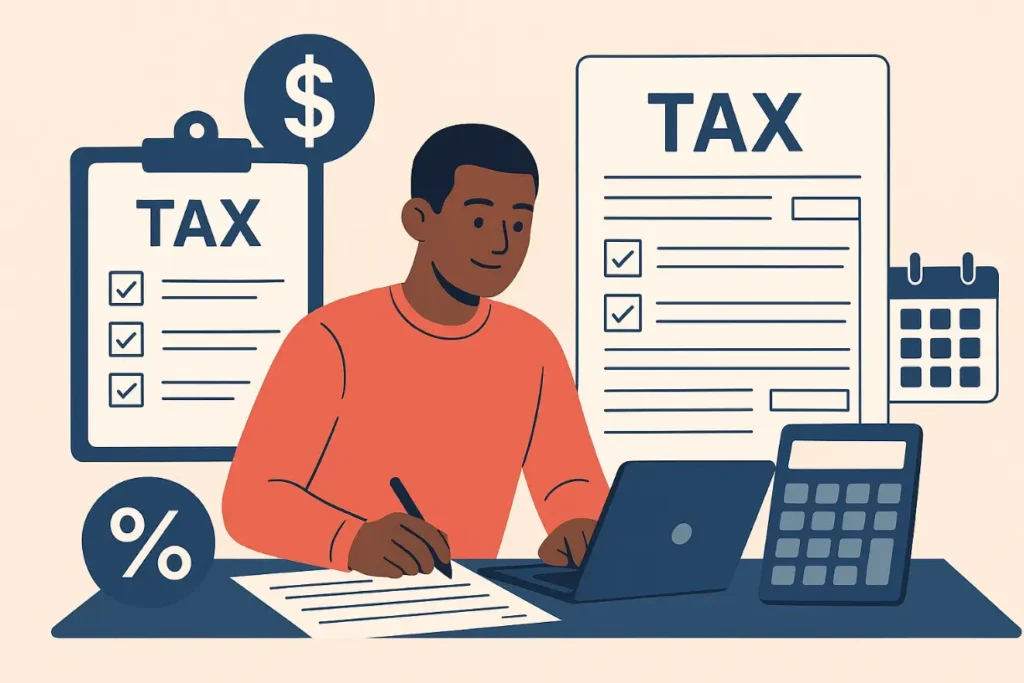Freelancers and contractors need a simple, repeatable tax system that protects cash flow and cuts surprises. This guide turns tax planning for freelancers into clear steps that work across busy and slow seasons. Ready to reduce stress and keep more profit? Start a tax planning session with Koffex Accounting.
What tax planning means for independent pros
Tax planning is an all-year process that forecasts income, maps deductions, and schedules quarterly payments. It also covers entity selection, retirement contributions, and recordkeeping rules. The payoff is lower taxes, fewer penalties, and cleaner books for funding growth.
CTA: Book a Free Strategy Call
Core steps that anchor tax planning for freelancers
A strong foundation makes every other move easier and more accurate.
- Separate business money
Use a dedicated bank account and card. Feed every transaction into cloud software daily. Clean inputs produce reliable write-offs and faster filing. - Track every deductible expense
Record software, gear, phone, internet, home office, subcontractors, travel, education, and licenses. Store digital receipts and tag them the same day. - Estimate and pay quarterlies
Project annual income, divide into four estimates, and update each quarter. Send payments on time to avoid penalties and interest. - Choose the right structure
Sole prop keeps admin light. LLC adds liability protection. S Corp treatment may reduce self-employment tax once profits rise. Recheck structure each year.
CTA: See Your Savings Scenarios
Tools that remove hassle
Use accounting software with bank feeds, receipt capture, invoice reminders, and mileage tracking. Build a monthly checklist that includes bank reconciliations, a profit and loss review, and a cash forecast. Software organizes the data. A CPA turns the data into better decisions and keeps compliance tight.
Freelancers often forget that maximizing write-offs requires planning beyond receipts. Knowing exactly which business deductions tax planning apply builds confidence during filing and lowers taxable income.
Timing moves that lower taxes
Small timing shifts can unlock meaningful savings without harming operations.
- Income and expense timing
Pull forward qualified expenses when a higher bracket is likely. Delay billing near year-end only when next year’s bracket will be lower. Keep cash needs first. - Asset purchases
Plan equipment buys around Section 179 or bonus depreciation rules. Align big purchases with high-profit years to maximize deductions. - Contract rules that stabilize cash
Use deposits, milestone billing, and clear late-fee terms. Stable cash flow supports on-time quarterlies and stronger negotiating power.
Starting out can feel overwhelming, but new freelancers gain clarity with structured guidance. Setting up accounts, tax calendars, and expense rules early aligns with tax planning for startups that avoids common pitfalls.
Mistakes that drain money
Late or missed estimates, mixing personal and business spending, missing receipts, and once-a-year bookkeeping all raise costs. A 30-minute finance block each week prevents backlogs and protects deductions. Calendar alerts for each quarterly due date cut penalty risk to near zero.
When should freelancers register for VAT?
Register once turnover passes the threshold in your country. Voluntary registration may help reclaim VAT on expenses but adds admin. Confirm local rules.
What expenses can freelancers claim as allowable?
Software, equipment, phone, internet, home office, travel, subcontractors, professional fees, and education. Keep receipts and mileage logs to support every claim.
How can freelancers reduce self-employment tax?
Increase qualified retirement contributions, review S Corp elections when profits rise, and tighten expense tracking. Timing of income and purchases helps too.
How to plan quarterly tax payments effectively?
Project the year, divide into four estimates, and adjust each quarter with actuals. Use software reports and a CPA review to keep targets accurate.
Should freelancers incorporate or remain sole proprietors?
It depends on risk, profit level, and admin capacity. LLCs protect personal assets. S Corp treatment can reduce self-employment tax at higher profit levels.
Reddit-asked questions
Tax resources for freelancers—do I have to pay quarterly estimated taxes?
Yes when expected tax due crosses your jurisdiction’s threshold. Quarterly payments prevent penalties and smooth cash flow.
What are good tax saving strategies for freelance workers?
Separate accounts, rigorous receipt capture, retirement contributions, smart timing, and an entity review once profits increase.
Advice on filing taxes as an international contractor or freelancer?
Confirm residency, treaty rules, foreign reporting, and VAT or GST issues. Cross-border work benefits from specialized advice.
Final word and CTA
Freelance taxes reward consistent habits and timely moves. Put these steps on a calendar and savings compound every quarter. Schedule your strategy call with Koffex Accounting and turn tax season into a calm routine that supports growth.
Promotional hook: Koffex connects software, structure, and schedules into one clean system. Less hassle. Better cash flow. Smarter taxes.







